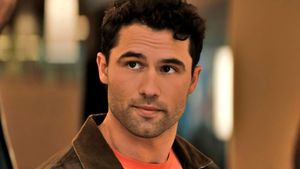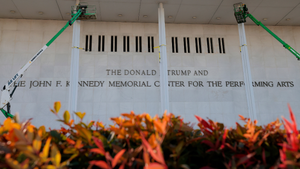Hillary Rodham
Clinton kept her White House hopes alive for a few more
weeks, if not months, defeating rival Barack Obama by 10
points in Pennsylvania's crucial primary and stamping
out speculation that she would exit the increasingly
divisive Democratic presidential race.
The victory,
however, did little to narrow her deficit in the
all-important delegate count.
Clinton, bidding
to be the first woman U.S. president, overcame massive
spending by Obama, who had significantly cut the New York
senator's early overwhelming advantage in the state.
But after a rugged and caustic six-week campaign,
voting blocs who favored Clinton -- older,
working-class, less-educated Pennsylvanians -- stood fast
behind her.
Speaking about
her victory, Clinton said Wednesday morning that her
coalition ''is the best to win against John McCain.'' She
told NBC television's Today program she had
already raised $3 million for her heavily indebted
campaign with an Internet appeal launched after her
Pennsylvania win.
When challenged
on voter assessments -- even among her supporters -- that
she ran a negative campaign, Clinton said, ''This is a very
civil campaign by any objective standard.'' She made
those remarks on the NBC cable TV show Morning Joe.
''That's just the
way campaigns are run,'' she said.
Nevertheless,
Obama leaves the hard-fought contest behind with his lead
in pledged delegates and the popular vote intact, as both
candidates move on the primary campaigns in the states
of Indiana -- a toss-up -- and North Carolina, where
the Illinois senator was expected to win easily
because of the large population of fellow African-Americans.
Some Democratic
leaders were looking for a closer Pennsylvania outcome
that could have led Clinton to leave the race, allowing the
party five months to unite behind Obama before the
November general election. Sen. John McCain, who
wrapped up the Republican nomination weeks ago, has
pulled even with both Democrats as their struggle to lead
the ticket has grown increasingly bitter.
Clinton left no
doubt Wednesday that she would not drop out of the race
before all primary and caucus contests were finished.
''We're going to
go through the next nine contests and I hope to do well
in many of them ... but I'm confident that when delegates --
as well as voters, like the voters of Pennsylvania
just did -- ask themselves who's the stronger
candidate against John McCain that I will be the nominee of
the Democratic Party.''
At a victory
rally in Philadelphia Tuesday night, Clinton told wildly
cheering supporters ''the tide is turning.''
''Some counted me
out and said to drop out,'' Clinton told supporters
cheering her triumph in a state where she was outspent by
more than two-to-one. ''But the American people don't
quit. And they deserve a president who doesn't quit
either.''
Despite her
optimistic assessment, she still faces a mathematically
impossible chore to overcome Obama's overall lead as they
move into what appeared to be an increasingly
polarizing battle.
Only half of each
Democrat's supporters said they would be satisfied if
the other won the nomination, according to interviews with
voters as they left polling stations.
Obama was flying
to Indiana when the race was called for his rival and
only learned the outcome on landing.
''After 14 long
months, it's easy to forget what this campaign's about
from time to time,'' Obama told a rally in Evansville, Ind.,
conceding that the Pennsylvania race turned nasty.
''It's easy to
get caught up in the distractions and the silliness and
the tit-for-tat that consumes our politics, the bickering
that none of us are entirely immune to, and it
trivializes the profound issues: two wars, an economy
in recession, a planet in peril, issues that confront our
nation. That kind of politics is not why we are here
tonight. It's not why I'm here, and it's not why
you're here.''
The Illinois
senator, who would become the first black U.S. president,
trailed in opinion polls in Pennsylvania all along but had
made up ground in the last few weeks, despite a series
of gaffes in a campaign that once ran with precision.
Exit polls showed
Clinton won the support of working-class voters, women,
and whites in an election where the economy was the dominant
concern. More than 80% of voters surveyed as they left
their polling places said the United States was
already in a recession.
Obama was favored
by blacks, the affluent, and voters who recently
switched to the Democratic Party, a group that comprised
about one in 10 Pennsylvania voters, according to the
surveys conducted by the Associated Press and U.S.
television networks.
Clinton won at
least 80 of the 158 delegates up for grabs in Tuesday's
contest, according to an analysis of election returns by the
Associated Press. Sen. Barack Obama won at least 66,
with 12 still to be awarded.
In the overall
race for the nomination, Obama led with 1,714.5 delegates,
including separately chosen party and elected officials
known as superdelegates. Clinton had 1,589.5
delegates, according to the AP tally.
Because there are
only nine contests remaining through June 3, Clinton
has only the remotest chance of finishing the race with more
elected delegates than Obama. Her main hope is keeping
the race close and seeking the support of the
superdelegates, who can vote for either candidate
regardless of state results.
Barring a huge
misstep by Obama, many superdelegates would be reluctant
to overturn the verdict of the millions of Americans who
have voted in record numbers in the most compelling
party presidential nominating race in memory.
Clinton is
touting her record winning most of the primaries in big
states and hoping superdelegates will see her
Pennsylvania victory as validation of her ability to
appeal beyond a narrow base in the general campaign.
''For six weeks,
Senator Obama and I crisscrossed the state ... being
judged side by side, making our best case,'' she told
supporters. ''You listened, and today you chose. With
two wars abroad and an economic crisis here at home,
you know the stakes are high and the challenges are
great. But you also know the possibilities ... are endless
with a president who's ready to lead on Day One.''
The keen interest
in the primary was reflected at polling stations in
Pennsylvania. Elections officials projected turnout among
Pennsylvania's 8.3 million registered voters at 40% to
50%, double that of the state's primary four years
ago.
Obama reported
spending more than $11 million on television in
Pennsylvania, more than anywhere else. That compared with
less than $5 million by Clinton.
Given President
George W. Bush's low approval ratings, a Democratic
victory in the November election was once considered all but
assured, but the drawn out and increasingly nasty
Democratic contest has left McCain to draw even in
polling.
Republicans were
bolstered by a string of trouble for Democrats leading
up to Tuesday's primary.
Obama was forced
on the defensive by incendiary comments by his former
pastor, the Reverend Jeremiah Wright, then triggered
controversy on his own by saying small-town Americans
cling to guns and religion because they are bitter
about their economic hardships.
Clinton conceded
that she had not landed under sniper fire in Bosnia
while first lady, even though she said several times that
she had. And she replaced her chief strategist, Mark
Penn, after he met with officials of the Colombian
government who were seeking passage of a free-trade
agreement that she opposes. (Steven Hurst, AP)




































































Charlie Kirk DID say stoning gay people was the 'perfect law' — and these other heinous quotes